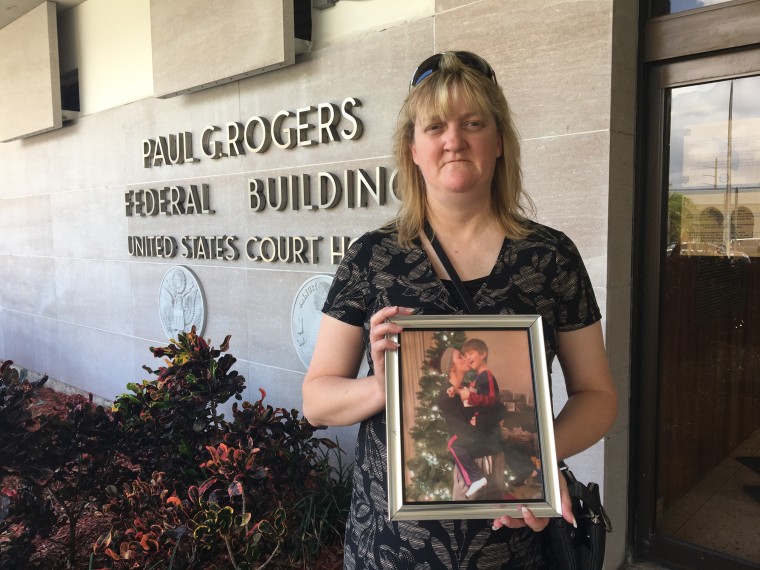One by one, the five mothers confronted the man they hold responsible for the death of their children, young people recruited by a corrupt rehab program in South Florida who never got the help they needed and eventually overdosed.
The object of their anger, Kenneth Chatman — the architect of a multimillion-dollar scheme that turned desperate addicts into money machines and forced women into prostitution — showed little emotion as he listened to their stories and waited to hear how much time he will spend in prison.
"You destroyed my life," Tina Pekar, whose son Ryan overdosed in one of Chatman's two "sober homes" in 2014, said in federal court on Wednesday.

Sandy Hinkle's 23-year-old daughter, Kaitlyn Cruea, died of an overdose in February 2016. She had never been on a plane before but flew from Ohio to West Palm Beach to deliver a message to the judge who would decide Chatman's fate.
"I can't express the hurt he has caused," she said. "Please give him the maximum sentence."
After the mothers and five other victims spoke, Judge Donald Middlebrooks sentenced Chatman to nearly 28 years in prison for conspiracies to commit health care fraud, money laundering and sex trafficking. His wife, who let the treatment center run under her name, got three years.
Chatman's indictment was the largest and most visible in a crackdown by state and federal officials in South Florida on a substance abuse treatment industry many describe as broken.
They say unscrupulous treatment centers there seek out young people, who are often addicted to heroin, from around the country. But instead of getting the quality treatment promised, they end up in poorly run halfway houses and rehab programs that rack up hundreds of thousands of dollars in insurance bills.
Chatman's attorneys said he was remorseful and described him as a "scapegoat" for a system rife with corruption. But federal prosecutor Marie Villafana told the court that while Chatman was not the only bad operator in town he stood out for the nature of his crimes.
"Mr. Chatman was not considered the biggest player in this industry," she said. "But he was considered the most dangerous."
Chatman, who pleaded guilty, admitted he prostituted women who came into his orbit. It happened at the "sober homes" or halfway houses he controlled, as well as local motels. Prosecutors said he advertised the women on Craigslist and Backpage.com and used drugs and threats of eviction to force them to perform sex acts.
Though the women weren't required to attend treatment, he took samples of their urine and saliva to send to labs, then billed their insurance for care they never received, authorities said.
One of those women, 22-year-old Savannah H., stood before the court, her magenta dyed-hair pulled back, and told in a trembling voice how Chatman kidnapped her in 2015, and kept her hostage in one of his sober homes, tying her to a bed and drugging her.
"I recall close to 150 in total different faces of rapists abusing me daily over a period of three to four weeks," she said. "I thought I was going to die there."
She escaped by jumping from a window of the home, wearing only a T-shirt, and later went to the police with her story.
"In a place where you are supposed to feel the safest, [get] treatment, I experienced some of the most gruesome acts that I can think of," she said, asking that Chatman be put away "so not only can he not get to me again, but so he can't do this to other human beings."
Schuyler Smith, who testified that he spent five months at Chatman's, said he saw girls being prostituted. Chatman, he said, condoned drug use at his sober homes.
"He got blood on his hands that he can't wash," he said.
Throughout the proceedings, Chatman's wife, Laura, sat at the defense table with her eyes covered, barely looking at her him. In March, she pleaded guilty to two felony counts for allowing her husband to use her name to open up the treatment center even thought he had a prior conviction for fraud, which barred him from owning one under Florida law.
Before the judge sentenced her, he asked if she wanted to speak. She pulled the microphone toward her. Then she broke down.
"I can't even imagine what these families are going through and I'm sorry," the mother of four said. "I am truly sorry for your losses."
After the sentencing, families gathered outside the courthouse and sorted through their emotions.
Danielle Ramos, whose sister overdosed a few months after leaving Chatman's center, teared up when asked about the verdict.
"I don't know if 90 years would have been appropriate," she said. "One day he'll be able to walk out and hug his child. That's something I'll never be afforded."